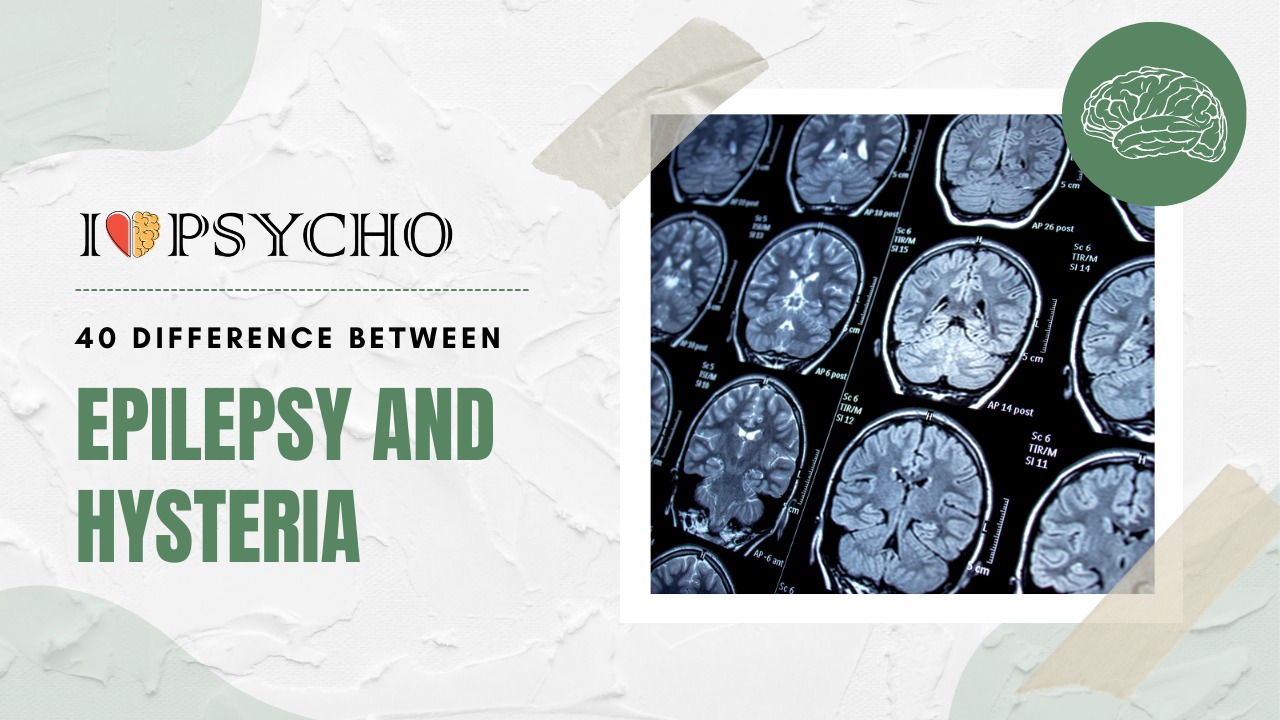Epilepsy and hysteria have different origins, symptoms, and treatments. Epilepsy is a chronic neurological illness that causes unexpected seizures from aberrant brain electrical activity. Seizures cause convulsions, altered awareness, and sensory abnormalities. Brain damage, genetic abnormalities, or developmental defects often cause the illness. Hysteria, now called conversion disorder in modern medicine, is a psychiatric illness that turns emotional discomfort into physical symptoms. Paralysis, blindness, and numbness may occur without an organic reason. Unresolved trauma, stress, or psychological issues may cause hysteria.
Epilepsy is caused by neurological abnormalities and hysteria by psychological anguish. Epilepsy is diagnosed by aberrant brain wave patterns on electroencephalograms (EEGs), but hysteria does not. Epilepsy is treated with antiepileptic drugs or surgery to correct abnormal brain electrical activity, while hysteria is treated with psychotherapy to address the psychological factors causing conversion symptoms.
Finally, epilepsy and hysteria differ in genesis, clinical appearance, diagnosis, and therapy. Epilepsy causes recurring seizures, while hysteria is caused by psychological anguish and causes physical symptoms without an underlying cause. Recognizing these distinctions helps diagnose and treat these illnesses.
|
S. No. |
Aspect |
Epilepsy |
Conversion Disorder (formerly “Hysteria”) |
|
1 |
Nature |
Neurological disorder |
Psychological condition |
|
2 |
Seizures |
Characterized by recurrent seizures |
Involves motor or sensory symptoms |
|
3 |
Cause |
Abnormal brain activity or structural changes |
Psychological distress or conflict |
|
4 |
Brain Activity |
Abnormal electrical discharges in the brain |
Psychological factors affecting motor function |
|
5 |
Diagnosis |
Based on EEG, medical history, and symptoms |
Based on psychological evaluation |
|
6 |
Physical Manifestation |
Convulsions, loss of consciousness, muscle spasms |
Motor or sensory symptoms (e.g., paralysis) |
|
7 |
Neurological Origin |
Brain dysfunction |
Mind-body interaction |
|
8 |
Triggers |
Some cases triggered by specific stimuli |
Often triggered by psychological stressors |
|
9 |
Treatment |
Medication, lifestyle changes, surgery |
Psychotherapy, addressing underlying factors |
|
10 |
Physical Examination |
May show abnormal brain activity or structural issues |
Typically lacks physical abnormalities |
|
11 |
Electroencephalogram (EEG) |
Often used for diagnosis |
Not necessary for diagnosis |
|
12 |
Medication |
Antiepileptic drugs |
Focused on addressing psychological factors |
|
13 |
Age of Onset |
Can occur at any age |
Often presents in adolescence or early adulthood |
|
14 |
Seizure Types |
Different types (tonic-clonic, absence, etc.) |
Various motor or sensory symptoms |
|
15 |
Emotional Impact |
Can cause emotional and cognitive effects |
Emotional distress often associated |
|
16 |
Stigma |
Stigma may be associated with epilepsy |
Stigma may have been associated with “hysteria” |
|
17 |
Imaging Techniques |
MRI, CT scans might show structural abnormalities |
Imaging may be normal |
|
18 |
Prognosis |
Can vary; some people achieve good control |
Can improve with proper treatment and support |
|
19 |
Social Implications |
Can affect daily life and social interactions |
Can also impact daily functioning |
|
20 |
Awareness during Episode |
Often impaired during seizures |
Often present; symptoms may be unconscious |
|
21 |
Neurologist Involvement |
Usually treated by neurologists |
May involve collaboration with psychologists |
|
22 |
Duration |
Seizures tend to be brief and sudden |
Symptoms can be more persistent |
|
23 |
Physiological Response |
Psychological factors affecting bodily function |
|
|
24 |
Research |
Extensive research into neurological causes |
Less understood; research ongoing |
|
25 |
Medication Side Effects |
Possible side effects from antiepileptic drugs |
No direct medication side effects |
|
26 |
Diagnostic Criteria |
Clear criteria for different seizure types |
Symptoms often defy clear medical explanation |
|
27 |
Public Perception |
May not be well understood by the public |
Historical perceptions influenced by gender biases |
|
28 |
Historical Context |
Known for centuries, better understood now |
|
|
29 |
Brain Monitoring |
Often involves long-term EEG monitoring |
No need for continuous brain monitoring |
|
30 |
Surgery |
Surgical options for severe cases |
No surgical interventions for this disorder |
|
31 |
Medication Dependency |
Lifelong medication use might be needed |
Focus on addressing psychological factors |
|
32 |
Risk Factors |
Genetics, brain injuries, family history |
Psychological trauma, stress, conflict |
|
33 |
Medication Adjustments |
May require adjustments over time |
Focus on psychological interventions |
|
34 |
Impact on Life |
Can disrupt daily routines and activities |
Can cause significant impairment |
|
35 |
Medication Withdrawal |
Should be done under medical supervision |
Can involve withdrawal of physical symptoms |
|
36 |
Incidence |
Estimated prevalence in the population |
Incidence might be lower than historical “hysteria” claims |
|
37 |
Public Awareness |
Generally recognized as a medical condition |
Term “hysteria” has historical stigma |
|
38 |
Cultural Perceptions |
Views vary by culture and society |
Cultural understanding has evolved |
|
39 |
Epileptic Auras |
Some people experience auras before seizures |
No equivalent phenomenon in Conversion Disorder |
|
40 |
Social Support |
Support groups and organizations available |
Psychosocial support is important |
Frequently Asked Questions (FAQS)
Q1. What causes epilepsy?
Epilepsy causes unexpected seizures. Brain electrical abnormalities cause these seizures. Genetics, brain damage, infections, developmental abnormalities, and unknown reasons can cause epilepsy.
Q2. Is epilepsy fixable?
Epilepsy can usually be controlled. Medication, lifestyle changes, and surgery reduce seizures in many epilepsy patients. Treating seizures improves the quality of life.
Q3. What is hysteria/conversion disorder?
Hysteria, now called conversion disorder, is a psychiatric illness where emotional discomfort or psychological conflicts manifest as physical symptoms without an underlying explanation. Paralysis, blindness, and sensory abnormalities may occur. Conversion disorder is psychological, unlike epilepsy.
Q4. How is epilepsy diagnosed?
Medical history, physical exam, and diagnostic testing usually identify epilepsy. Electroencephalograms (EEGs) measure brain electrical activity and can reveal epilepsy-related abnormalities. MRI and CT scans can detect structural brain problems.
Q5. Are epilepsy and hysteria treated similarly?
Epilepsy and hysteria have different causes, hence their therapies differ. Lifestyle changes, antiepileptic medicines, and surgery can treat epilepsy. Psychotherapy treats conversion disorder by treating psychological causes or conflicts that cause physical symptoms.









